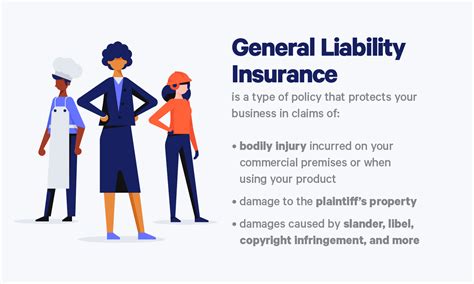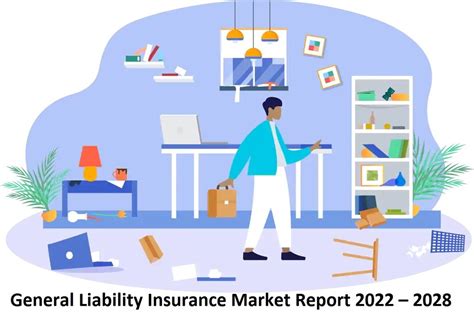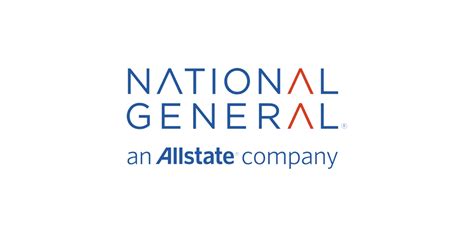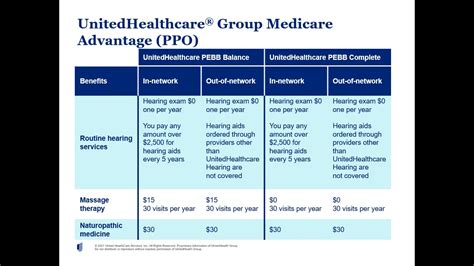General Liability Insurance

In the complex world of business and risk management, one essential aspect that every entrepreneur or business owner must understand is general liability insurance. This type of insurance is a fundamental component of any business's risk mitigation strategy, offering protection against a wide range of potential liabilities. In today's dynamic and unpredictable business landscape, it is more crucial than ever to have comprehensive coverage. This article aims to provide an in-depth exploration of general liability insurance, covering its definitions, coverage details, exclusions, importance, real-world examples, and future trends.
Understanding General Liability Insurance

General liability insurance, often referred to as commercial general liability (CGL) insurance, is a form of liability insurance that protects businesses from various claims including bodily injury, property damage, personal and advertising injury, and medical payments. It serves as a vital safety net, offering financial protection to businesses against a wide range of unforeseen events that could potentially result in significant financial losses.
The primary purpose of general liability insurance is to shield businesses from the financial burden that arises from accidents, injuries, or property damage that occur during the normal course of business operations. It is designed to cover a wide spectrum of risks, from a customer slipping and falling in your store to your product causing damage to someone's property. By having this insurance in place, businesses can focus on their core operations with the assurance that they are financially protected against potential liabilities.
Key Coverage Details

General liability insurance typically offers coverage for a wide array of incidents, including:
- Bodily Injury: Covers medical expenses and potential legal fees if a customer, client, or visitor is injured on your business premises or as a result of your products or services.
- Property Damage: Provides coverage if your business activities result in damage to someone else's property, including their building, inventory, or equipment.
- Personal and Advertising Injury: This aspect of general liability insurance covers claims related to defamation, copyright infringement, or invasion of privacy, often arising from advertising materials or public statements made by your business.
- Medical Payments: Offers coverage for minor medical expenses, regardless of fault, for injuries that occur on your business premises.
For instance, if a customer trips over a loose cable in your office and breaks their arm, general liability insurance would cover the cost of their medical treatment and any potential legal fees if they decided to pursue a lawsuit. Similarly, if your delivery van accidentally hits a pedestrian, this insurance would cover the injured person's medical bills and any legal costs arising from the incident.
Exclusions and Limitations
While general liability insurance offers comprehensive coverage, it is important to note that it does not cover all types of risks. Some common exclusions include:
- Professional Liability: General liability insurance does not cover claims arising from professional services or advice. For this, businesses often need separate professional liability insurance, also known as errors and omissions insurance (E&O insurance).
- Employment-Related Claims: Incidents such as workplace injuries, discrimination, or harassment are typically not covered by general liability insurance. These types of claims are usually addressed by workers' compensation insurance or employment practices liability insurance (EPLI).
- Intentional Acts: Claims resulting from intentional acts or criminal activities are generally not covered.
- Pollution: Environmental pollution claims are often excluded from general liability policies and may require separate pollution liability insurance.
The Importance of General Liability Insurance
General liability insurance plays a critical role in safeguarding businesses from the financial repercussions of various liabilities. In today’s litigious society, businesses face an increasing number of risks, and without adequate insurance coverage, a single lawsuit or claim could potentially lead to bankruptcy.
Consider a small bakery that has built a loyal customer base over the years. If a customer were to choke on a cookie due to an unexpected foreign object, the bakery could face significant legal and medical costs. Without general liability insurance, the bakery might not be able to afford these expenses, leading to potential closure. However, with the right coverage in place, the bakery can navigate this challenging situation with financial protection and continue to serve its customers.
Real-World Examples

The significance of general liability insurance is best illustrated through real-world scenarios. Here are a few examples:
- Retail Store: A customer slips on a wet floor in a retail store and sustains a serious injury. The customer sues the store for negligence. General liability insurance would cover the legal fees and any settlement or judgment costs.
- Construction Company: A construction company's equipment accidentally damages a nearby residential property during a project. The homeowners file a claim for property damage. General liability insurance would provide coverage for the cost of repairs and any legal fees associated with the claim.
- Manufacturing Business: A manufacturing business produces faulty products that cause bodily harm to several consumers. The business is sued for product liability. General liability insurance would cover the medical expenses, legal fees, and potential damages awarded to the injured parties.
Future Trends and Innovations
The landscape of general liability insurance is continually evolving, driven by technological advancements, changing business dynamics, and evolving regulatory environments. Here are some key trends and innovations to watch out for:
Cyber Risk Coverage
With the increasing reliance on digital technologies, businesses are becoming more vulnerable to cyber risks. Many general liability insurance policies are now being extended to include coverage for cyber incidents such as data breaches, hacking, and cyber extortion.
Emerging Technologies
As businesses adopt emerging technologies like artificial intelligence, blockchain, and the Internet of Things (IoT), general liability insurance is adapting to cover potential risks associated with these innovations. For instance, insurance policies are now being tailored to address liability concerns related to autonomous vehicles, smart devices, and AI-driven systems.
Enhanced Risk Assessment and Underwriting
Insurance companies are leveraging advanced analytics and data science to more accurately assess and underwrite risks. This includes the use of big data, predictive modeling, and AI to identify patterns and trends that can inform underwriting decisions and risk management strategies.
Sustainability and Environmental Concerns
With a growing focus on sustainability and environmental responsibility, general liability insurance is evolving to address green initiatives and environmental risks. This includes coverage for businesses adopting renewable energy sources, as well as liability concerns related to climate change and environmental damage.
FAQ
What is the difference between general liability insurance and professional liability insurance?
+General liability insurance covers a broad range of risks, including bodily injury, property damage, and personal and advertising injury. On the other hand, professional liability insurance, also known as errors and omissions insurance (E&O insurance), specifically covers claims arising from professional services or advice. It protects against lawsuits resulting from mistakes, errors, or failures in providing professional services.
How much does general liability insurance cost?
+The cost of general liability insurance can vary widely depending on factors such as the nature of your business, the size of your operation, the level of coverage you require, and your business’s location. On average, small businesses can expect to pay between 300 and 1,000 per year for general liability insurance. However, it’s important to get multiple quotes and compare policies to find the best coverage at the most competitive price.
Are there any businesses that don’t need general liability insurance?
+While certain businesses may perceive a lower risk and choose to operate without general liability insurance, it is generally recommended that all businesses carry this type of coverage. Even low-risk businesses can face unexpected liabilities, and without insurance, they may be financially devastated by a single claim. It’s always better to be prepared and protected.



